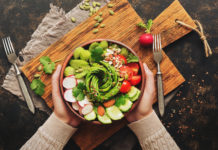
We grow up with the notion of dieting all around us. From ads to movies, to friends and family, society has created a complicated relationship between us, our bodies and the food we eat. It’s completely normal to feel like your relationship with food is constantly rocky, but there is a way to simplify it and get back to the basics without overthinking everything you eat. We’re talking about intuitive eating- a way of living that says goodbye to diets and focuses on understanding your body and what it needs from you. Today’s post looks at intuitive eating for beginners so you can fuel your body without guilt!
What is Intuitive Eating?
Intuitive eating is the opposite of a traditional diet. It puts you in control, urging you to become the expert of your own body and learn its hunger signals. There are no guidelines on what to eat and what to avoid, promoting a healthy attitude toward food and body image. The main idea around intuitive eating is that you should eat when you’re hungry and stop when you’re full. This main sound simple, but due to the mental effects of dieting, it’s a lot tougher than it seems. The goal of intuitive eating is starting to trust your body again and learning to differentiate between emotional and physical hunger.
Physical hunger is your body’s biological response that urges you to replenish nutrients in your body. There are different signs of physical hunger such as a growling stomach, fatigue and irritability. Physical hunger is satisfied when you eat any food.
Emotional hunger is driven by emotions such as sadness, loneliness, and boredom. These feelings can trigger cravings for food, and more specifically comfort foods. Emotional eating typically leads to guilt and regret.
10 Principles of Intuitive Eating
Intuitive eating is made up of ten main principles. Take a look at them below.
1. Ditch the Diet Mentality
Intuitive eating is the anti-diet. Ditching the diet mentality means dropping the belief that there’s a diet out there that will work for you and trusting your body to get you to your healthiest weight.
2. Honour Your Hunger
Hunger is normal. If you’re hungry, feed your body. Get to know your early signs of physical hunger and respond to them by feeding your body. Keep in mind that it’s likely that you’ll overeat if you allow yourself to get excessively hungry.
3. Make Peace with Food
Get rid of any ideas that you should or shouldn’t eat, and give yourself permission to eat whatever you want. If you tell yourself you can’t or shouldn’t have certain foods, you’ll eventually feel deprived, which can lead to uncontrollable cravings and overeating.
4. Challenge the Food Police
The food police are the thoughts in your head that tell you you’re good for eating foods like salad and vegetables, and bad for eating foods like pastries and mac n’ cheese. Food is not good or bad and you are not good or bad for what you eat or don’t eat. Follow this principle and ignore anything that tells you otherwise.
5. Respect Your Fullness
Your body will tell you when you’re full, and it’s healthy to listen to it. Figure out the feelings of comfortable fullness that signal you’ve had enough and are satisfied. Pause partway through a meal or snack to check in with yourself. Ask yourself how the food tastes and if you’re still hungry or feeling full.
6. Discover the Satisfaction Factor
It’s possible to be physically full, but not feel satisfied. When you’re not satisfied, you’re more likely to overeat, looking for that one thing that will make you feel satisfied and content. Create eating experiences that are enjoyable for you. Have a meal that tastes good and sit down to eat it. When you eat what you really want, it will help you feel content- and usually with less food.
7. Cope With Your Emotions Without Using Food
While food can become a way to cope with emotions like loneliness and boredom, it’s important to find other ways to deal with these feelings. Try things like exercising, meditating, journaling or calling or making plans with a friend. Building up different coping skills is an important part of intuitive eating.
8. Respect Your Body
We’re our own worst critics, especially when it comes to our bodies and the way we look. An important part of intuitive eating is learning to respect your body how it is at this very moment. It’s difficult to reject the diet mentality if you’re too critical of your body.
9. Exercise and Feel the Difference
Find workouts and exercises that you enjoy. Instead of focusing on workouts you think you “should be doing”, move your body in ways that feel good to you. Do you love yoga? Are you a cycling fanatic? Do you love group bodyweight classes? Forget about the amount of calories you burn and get in touch with how you feel after the workout. Do you feel energized? Does it help you sleep? Do you feel more productive and creative? If yes, these are the exercises you should stick to.
10. Honour Your Health with Gentle Nutrition
The food you eat should taste good and make you feel good. Being healthy doesn’t mean eating perfectly all the time. One meal or snack here and there isn’t going to make or break your health- it’s the consistency and patterns of what you eat over time. Find foods that make you feel good, and that are satisfying and tasty.
Does Intuitive Eating Cause Weight Gain?
Your body will do one of three things if you follow intuitive eating- you’ll gain weight, lose weight or your weight will remain the same. None of these options mean you’re successful or unsuccessful with intuitive eating. Intuitive eating shouldn’t be promoted as a way to lose weight, so if you see that anywhere, be wary of it. It also doesn’t mean that you’ll definitely gain weight, either. If you’ve been following restrictive diets that don’t allow you to eat much, you may gain weight in a healthy way.
Intuitive Eating for Beginners: 4 Tips
1. Read the Intuitive Eating Book
Intuitive eating was made popular by a book written by Evelyn Tribole and Elyse Resch. Originally published in 1995, it still remains popular today. Read it to get a full understanding of intuitive eating!
2. Make a List of Foods That Make You Feel Regret
For all of us, there are certain foods that make us feel out of control. These foods are the foods we can’t stop eating until we feel sick, or we feel major guilt and regret about eating them immediately after we consume them. Make a list of these foods so you know exactly what they are.
3. Include One “Pleasure Food” in Your Meals Each Day
A pleasure food is something that tastes good and satisfies you, but is likely something you try not to eat due to a certain diet. It’s important to normalize pleasure foods. It makes it less likely for you to get out of control and binge on them. Include one pleasure food in your meals each day to help you normalize them.
4. Practice Taking Breaks While You Eat
Most people I know eat their meals really fast. They don’t take a break and just scarf their whole meal in one go. The next time you sit down for a meal, take breaks while you eat to see how you feel. If you start to feel yourself becoming full, you don’t need to take another bite. If you still feel hungry after your break, then go ahead and eat more. Once you feel full, remove yourself from where you’re eating so you’re not tempted to eat more.
Ready to try intuitive eating? Follow these core principles and tips to start your journey off right.
















